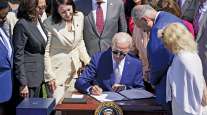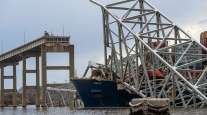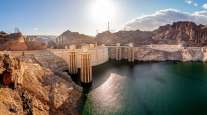Expert Predicts Taxes, Fees on Trucks Will Account for More of Highway Trust Fund

WASHINGTON — A higher percentage of federal Highway Trust Fund dollars will come from diesel fuel taxes and other fees on trucks as future government rules require ever-better gas mileage for passenger cars. That was the message from Joung Lee of the American Association of State Highway and Transportation Officials during an Infrastructure Week session on May 19.
Lee noted that 12% of those dollars derive from truck fees, but he added, “Gas tax receipts will stay flat or go down over the next decade, so a higher share will come from diesel since truck traffic is projected to increase [substantially].”
Less gasoline is sold because cars are more efficient, but federal transportation still overwhelmingly relies on taxes on that fuel, prompting Jeff Davis of the Eno Center for Transportation to wonder, “Has the concept of user fees for this system reached its sell-by date?”
INFRASTRUCTURE WEEK COVERAGE: Via TT's Capitol Agenda
Ed Mortimer of the U.S. Chamber of Commerce emphasized that his group and its usual opposite number on issues, the AFL-CIO, agreed on the importance of infrastructure to the American economy.
“We [once] had infrastructure that was the envy of the world, but we let it decay,” Mortimer lamented. “A decade ago, we were No. 8 in the world. Now we’re No. 16. We’re competing against the world, and we’re falling behind. We can’t allow that to happen. Maintenance isn’t sexy. Ribbon cuttings are sexy. But if you don’t maintain what you have, the costs are exponential. If we had indexed the [federal] gas tax, there would’ve been an extra $100 billion to $150 billion. Imagine what we could have done with that.”
But because the long-awaited FAST Act didn’t raise the federal fuel tax when it became law last December, Eno’s Emil Frankel said, “The burden on states and localities is greater. We have to make better decisions about how we invest public funds in infrastructure.”
Or as Joe McAndrew of Transportation for America put it, “We’ll never have enough to fund the projects [we want], so we have to get the biggest bang for the buck.”
Brigham McCown of the Alliance for Innovation and Infrastructure urged the state legislators on hand to share best practices, and he endorsed public-private partnerships as a partial answer to funding woes.
“There’s a lot of private funding out there, but there has to be a return on the investment,” McCown said. “P3s can and should work if they’re done correctly.”
To pay for the nation’s $1.4 trillion gap in infrastructure funding, the American Society of Civil Engineers wants to nearly double the federal gas tax, unchanged since 1993, to 36 cents per gallon.
“Infrastructure is the backbone of our economy, [but] the bill is overdue,” ASCE’s Brian Pallasch said. “Filling the hole is important, but shouldn’t we [be doing more]? Most of the gap in infrastructure investment is in transportation.”
Pallasch said that each American family will lose $9 per day in 2025 because of time and fuel wasted due to failing infrastructure, and he suggested that paying $3 per day now would prevent that from happening.
Alison Black of the American Road & Transportation Builders Association said that federal highway funds provided, on average, 52% of annual capital outlays for highways and bridges in the states over the decade that ended in 2013.
“Transportation is truly a bipartisan issue,” said Black, who noted that seven of the eight states that passed fuel tax increases in 2016 had Republican governors and legislatures. She pointed out that about 90% of state legislators who voted to raise fuel taxes in 2013 were re-elected in 2014.




